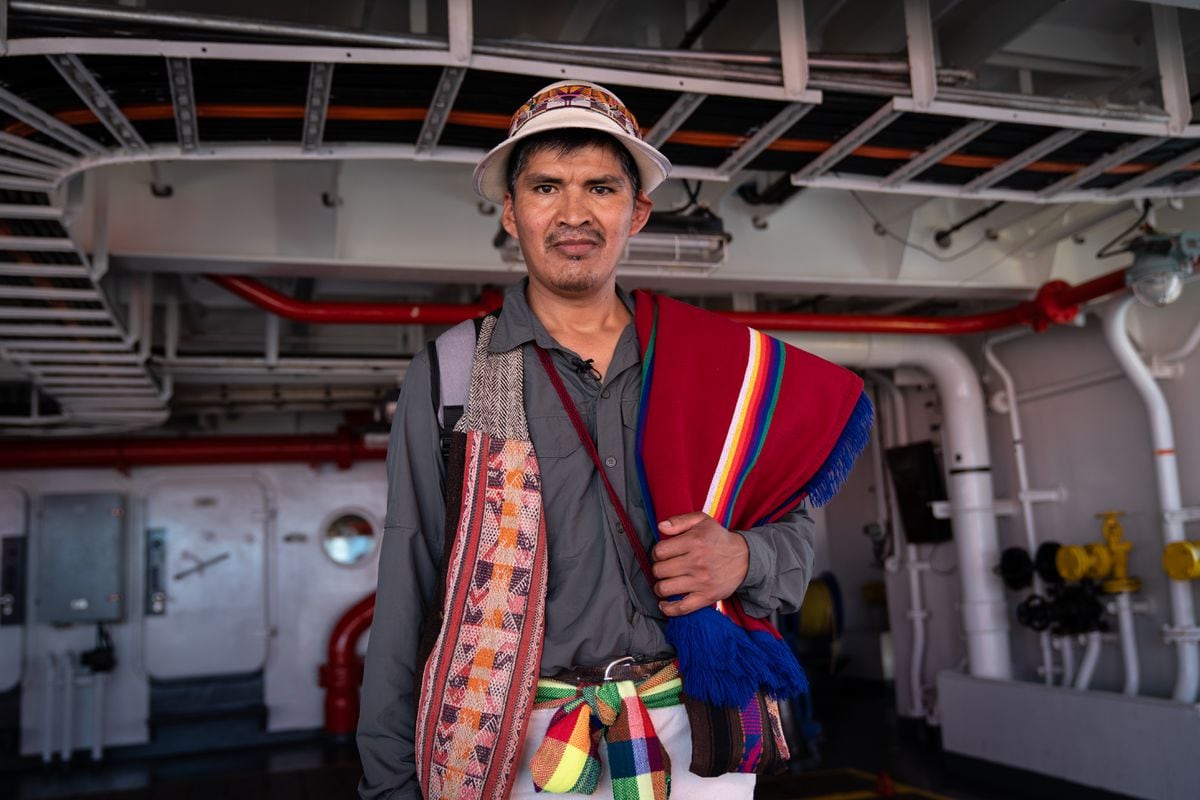Tata Samuel Flores Cruz, indigenous authority of the Qhara Qhara nation of Bolivia, participated a few weeks ago in the international symposium on the San José galleon organized by the Government of Colombia in Cartagena de Indias.
Flores, 44, who serves as the legal representative of his people before the IACHR in the galleon case, is grateful that President Gustavo Petro has recognized the Qhara Qhara's claim for part of the ownership of the cargo.
He agrees with the Colombian Government that what is inside the ship is not treasure, but rather archaeological heritage.
He assures that Spain “can take what remains of the ship, the cannons, if they want, but the cargo belongs to the indigenous people.”
The interview takes place during a visit to the ship Caribe of the Colombian navy, the ship whose mission is to rescue the first pieces of the Galleon in 2024.
Ask.
Why does the Qhara Qhara nation claim a share of ownership of the San José galleon?
Answer.
Because many of the minerals that the Galleon carried came from the Potosí mines.
They were in our territory.
Our indigenous people took them out.
They are ours.
This is documented in the tax logs and royal archives.
Q.
What are the requests of your people in relation to San José?
A.
First, we want the exploration proposed by the Colombian Government to be carried out, to remove and identify the value and historical origin of the things that are down there.
We want science to say where and how it came from, what things there are.
Not only the shipment of minerals, but also other objects that were smuggled there.
Only by seeing and touching everything that is sunken can we study and understand it.
Those objects are useless in there.
You have to get everything out.
Q.
There are scientists who believe that by bringing objects to the surface after 300 years under the sea they can decompose, fall apart...
A.
I don't think anything will happen with silver and coins.
Wood and earth can be modified, but gold cannot, ever.
Gold dust or bullion or coins are still gold.
I think we have to take it out to dry land.
While at the bottom you run natural and human risks.
There may be robberies, looting.
Q.
Do you have an estimate of what is in the Galleon's cargo?
A.
We know that there are 50,000 gold coins from church loans sunk in the galleon San José.
There are also silver and gold ingots, and other artifacts such as jewelry, which were looted from the tombs of our ancestors.
There are also crew utensils, clothing, dishes and defense artifacts.
Q.
Do you want a part of what is extracted to be for you?
A.
We want to identify how much came from our nation and other indigenous peoples.
Q.
Do you agree with the Government's idea of not seeing the galleon as a treasure but as archaeological heritage?
Q.
Yes, in fact that is part of the proposal that we made in 2017 to former president Juan Manuel Santos.
From the beginning we said that the galleon should be a common good.
History includes many peoples who participated in some way.
I hope we understand it as cultural heritage of humanity.
We do not have the idea of commodifying and commercializing what is inside.
That is why we believe that Colombia made a healthy decision.
We are glad that exploration is about to begin and that the Qhara Qhara people can participate.
Q.
Why are you interested in participating in the exploration process?
A.
Because going forward we have many galleons to remove, we know of at least 200 shipwrecks that may have things from the Qhara Qhara nation.
It is a step to the future.
The things that are in the galleon are very important to reconstruct the history of the colony.
They will help us know what the administration was like, the collections of silver, gold and other belongings from the ancestral towns.
This can help our new generations know the history of the colony.
Being aware of it is the only way to live together.
Q.
Do you think the shared heritage of the galleon should be between Colombia, Spain and the Qhara Qhara nation?
R.
Spain has said that they also have the right because the galleon belonged to them, but it seems to me that they have to reflect.
The Spanish ancestors did a lot of damage to our people by coming and taking our things.
Furthermore, this shipment is from the colony, not the republic.
That's clear.
Spain can take what's left of the ship, the cannons, if they want, but the cargo belongs to the indigenous people because everything came from our towns.
We hope that there will be no lawsuits or litigation, but rather cooperation and dialogue.
Subscribe here
to the EL PAÍS newsletter about Colombia and
here to the WhatsApp channel
, and receive all the key information on current events in the country.

